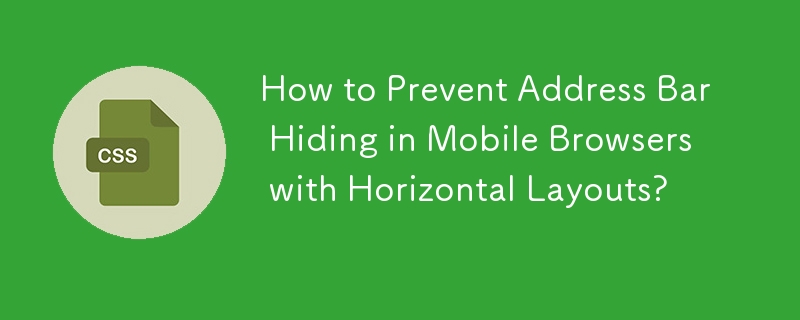 Web Front-end
Web Front-end
 CSS Tutorial
CSS Tutorial
 How to Prevent Address Bar Hiding in Mobile Browsers with Horizontal Layouts?
How to Prevent Address Bar Hiding in Mobile Browsers with Horizontal Layouts?
How to Prevent Address Bar Hiding in Mobile Browsers with Horizontal Layouts?

Addressing Prevent Address-Bar Hiding in Mobile Browsers
When developing websites with a horizontal layout, preventing the automatic hiding of the address bar in mobile browsers becomes a crucial issue. The browser's ability to scroll below the actual content, triggering unnecessary events and conflicting with vertical scrolling functionality, can result in an undesirable user experience. This article delves into a solution that addresses this specific problem.
Proposed Solution
The underlying cause of the address bar auto-hiding mechanism is the browser's attempt to optimize the user experience by providing more screen space for content. To prevent this behavior, we can employ the following CSS rules:
<code class="css">html {
background-color: red;
overflow: hidden;
width: 100%;
}
body {
height: 100%;
position: fixed;
/* prevent overscroll bounce*/
background-color: lightgreen;
overflow-y: scroll;
-webkit-overflow-scrolling: touch;
/* iOS velocity scrolling */
}</code>In this solution:
- html Tag: Setting overflow to hidden prevents any content from overflowing from the root element and eliminates the scroll bar at the bottom.
-
body Tag:
- height: 100% restricts the body's height to the device's viewport, preventing the user from scrolling vertically beyond the content.
- position: fixed fixes the body's position on the screen, ensuring that it remains within the viewport.
- -webkit-overflow-scrolling: touch allows for smooth scrolling on iOS devices.
By implementing these CSS rules, the body becomes the only element allowed to scroll, and the address bar area is effectively hidden. This solution prevents any content from being pushed off the screen and ensures a consistent and optimized user experience across different devices.
The above is the detailed content of How to Prevent Address Bar Hiding in Mobile Browsers with Horizontal Layouts?. For more information, please follow other related articles on the PHP Chinese website!

Hot AI Tools

Undresser.AI Undress
AI-powered app for creating realistic nude photos

AI Clothes Remover
Online AI tool for removing clothes from photos.

Undress AI Tool
Undress images for free

Clothoff.io
AI clothes remover

Video Face Swap
Swap faces in any video effortlessly with our completely free AI face swap tool!

Hot Article

Hot Tools

Notepad++7.3.1
Easy-to-use and free code editor

SublimeText3 Chinese version
Chinese version, very easy to use

Zend Studio 13.0.1
Powerful PHP integrated development environment

Dreamweaver CS6
Visual web development tools

SublimeText3 Mac version
God-level code editing software (SublimeText3)

Hot Topics
 1664
1664
 14
14
 1421
1421
 52
52
 1315
1315
 25
25
 1266
1266
 29
29
 1239
1239
 24
24
 Google Fonts Variable Fonts
Apr 09, 2025 am 10:42 AM
Google Fonts Variable Fonts
Apr 09, 2025 am 10:42 AM
I see Google Fonts rolled out a new design (Tweet). Compared to the last big redesign, this feels much more iterative. I can barely tell the difference
 How to Create an Animated Countdown Timer With HTML, CSS and JavaScript
Apr 11, 2025 am 11:29 AM
How to Create an Animated Countdown Timer With HTML, CSS and JavaScript
Apr 11, 2025 am 11:29 AM
Have you ever needed a countdown timer on a project? For something like that, it might be natural to reach for a plugin, but it’s actually a lot more
 HTML Data Attributes Guide
Apr 11, 2025 am 11:50 AM
HTML Data Attributes Guide
Apr 11, 2025 am 11:50 AM
Everything you ever wanted to know about data attributes in HTML, CSS, and JavaScript.
 A Proof of Concept for Making Sass Faster
Apr 16, 2025 am 10:38 AM
A Proof of Concept for Making Sass Faster
Apr 16, 2025 am 10:38 AM
At the start of a new project, Sass compilation happens in the blink of an eye. This feels great, especially when it’s paired with Browsersync, which reloads
 How We Created a Static Site That Generates Tartan Patterns in SVG
Apr 09, 2025 am 11:29 AM
How We Created a Static Site That Generates Tartan Patterns in SVG
Apr 09, 2025 am 11:29 AM
Tartan is a patterned cloth that’s typically associated with Scotland, particularly their fashionable kilts. On tartanify.com, we gathered over 5,000 tartan
 How to Build Vue Components in a WordPress Theme
Apr 11, 2025 am 11:03 AM
How to Build Vue Components in a WordPress Theme
Apr 11, 2025 am 11:03 AM
The inline-template directive allows us to build rich Vue components as a progressive enhancement over existing WordPress markup.
 PHP is A-OK for Templating
Apr 11, 2025 am 11:04 AM
PHP is A-OK for Templating
Apr 11, 2025 am 11:04 AM
PHP templating often gets a bad rap for facilitating subpar code — but that doesn't have to be the case. Let’s look at how PHP projects can enforce a basic
 A Comparison of Static Form Providers
Apr 16, 2025 am 11:20 AM
A Comparison of Static Form Providers
Apr 16, 2025 am 11:20 AM
Let’s attempt to coin a term here: "Static Form Provider." You bring your HTML



